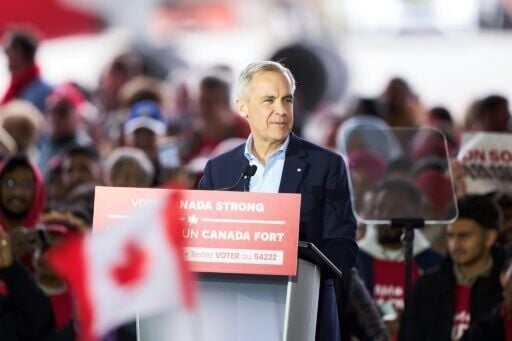Canadian leaders made their final push for votes Sunday, one day before an election dominated by US President Donald Trump's policies, but rattled in the campaign's final hours by a deadly car-ramming attack in Vancouver.
Prime Minister Mark Carney, the Liberal Party leader, is favored to beat Conservative leader Pierre Poilievre in Monday's vote, but polls show the race has tightened in recent days.
The prime minister briefly paused his campaign schedule on Sunday to address the nation after a driver plowed into a crowd at a Filipino street festival in the west coast city, killing 11 people.Â
Carney, a 60-year-old father of four, teared up as he voiced support for those affected.Â
"Last night families lost a sister, a brother, a mother, a father, a son, or a daughter," Carney said. "Those families are living every family's nightmare."Â
After cancelling an earlier event near Vancouver, the Liberal campaign said Carney would visit the city later on Sunday.Â
A 30-year-old man who police said had a history of mental health issues and previous interactions with law enforcement was in custody following the attack that injured dozens. Â
Poilievre, appearing alongside his wife at a church in the election battleground city of Mississauga west of Toronto, condemned the attack as a "senseless act of violence."
"Our hearts are with you today. All Canadians are united in solidarity with the Filipino community," Poilievre said.
The Vancouver attack briefly shifted the nation's focus away from Trump, whose trade war and threats to annex Washington's northern neighbor have outraged Canadians.Â
Polling consistently shows Canadians believe Carney -- a former investment banker who also led the central banks of Canada and Britain -- is the strongest candidate to take on Washington.
"This is an existential issue that we're facing," Ottawa resident Brian Carr told AFP on Sunday, referring to US government hostility.Â
Carr, 79, said he was supporting Carney because the Liberal leader "has demonstrated throughout his career that he is capable of leading and dealing with financial issues."
Julie Dunbar, a 72-year-old Ottawa resident, told AFP she was impressed by Carney's "experience on the international stage."
Since replacing Justin Trudeau as prime minister on March 14, Carney has sought to convince voters that his resume has prepared him to lead Canada through a trade war and respond to tariffs that are pinching key sectors like auto and steel.
- 'One more day' -
Poilievre, a 45-year-old who has been in parliament for two decades, has worked to keep the focus on living costs that soared during Trudeau's decade in power, arguing Carney would bring a continuation of what he calls failed Liberal governance.
Addressing an enthusiastic crowd in the southern Ontario city of Oakville on Sunday, Poilievre told supporters "time is running out."
"Only one more day to bring home change so that Canadians can afford food and homes and live on safe streets," he said.
At the rally, Tory supporter Janice Wyner told AFP that the country was "just in a mess."
"I'm 70 years old. It's not even a country that I recognize and I'm worried for my grandkids," she said.
Her estimation of the Liberals was not flattering, saying Trudeau's "policies stunk and it's the same party."Â
- Poll swings -
At the start of the year, Poilievre appeared on track to be Canada's next prime minister.
His party led the Liberals by more than 20 points in most polls on January 6, the day Trudeau announced his plans to resign.
But the Trudeau-for-Carney swap, combined with nationwide unease about Trump, has transformed the race.
Public broadcaster CBC's poll aggregator on Sunday put the Liberals' national support at 42.8 percent, with the Conservatives at 38.8 percent.Â
As with US elections, national polling numbers may not predict a result.
When voting closes on Monday, Conservatives will be closely watching the performance of the left-wing New Democratic Party (NDP) and the separatist Bloc Quebecois.Â
In past Canadian elections, strong NDP performances in Ontario and British Columbia, and a good showing by the Bloc in Quebec, have curbed Liberal seat tallies, but polls suggest both smaller parties could be facing a setback. Â
bur/bs/aha



